Microaggressions are either expressed as non-verbal or environmental insults. Either intended or unintended, it’s about passing negative comments to other people.
Just because those people belong to a different marginalized group, they get targeted to this behavior.
15 Signs To Spot Microaggressions In The Workplace
Are you also tired of constant slights and insults in your workplace? You must be dealing with microaggression from coworkers.
Microaggressions lead to creates a working environment that’s more negative. So other than leaving your job, what could be the other possible ways to cope with microaggressions?
First, let’s see how you can spot microaggressions in your company. And then learn the strategies to deal with it.
1. Targeting Someone On The Bases Of Their Looks
Microaggression can happen when a coworker or boss belongs to another race. Racial microaggressions create more damage than one can imagine.
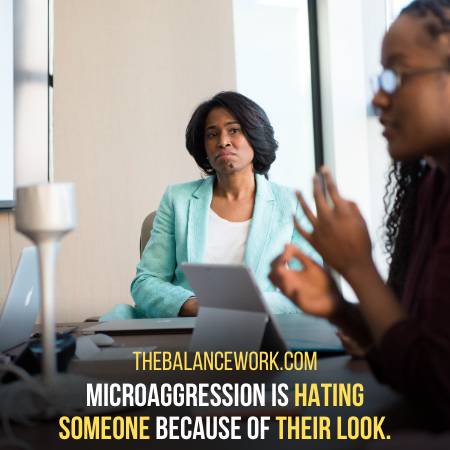
It creates an aggressive and contradictory work climate. Especially it drains out the motivation from individuals belonging to a different race. The consequences are frustration, sadness, irritation, bitterness, rage, anxiety, and many more.
To deal with this problem, you should take this matter to senior management. Or you can also carefully confront that person and ask them why they said so?
2. Color Blindness – Microaggressions In The Workplace
Microaggression denies people of different colors their race-related experience.
It won’t be right to assume that someone has specific characteristics because of background.
It binds a stereotype to a specific person and damages their identity by demeaning it.
3. Assuming The Criminal History
You might assume that a person is a criminal just because of the way he looks. Therefore, disqualifying such a person from getting a job is a microaggression.
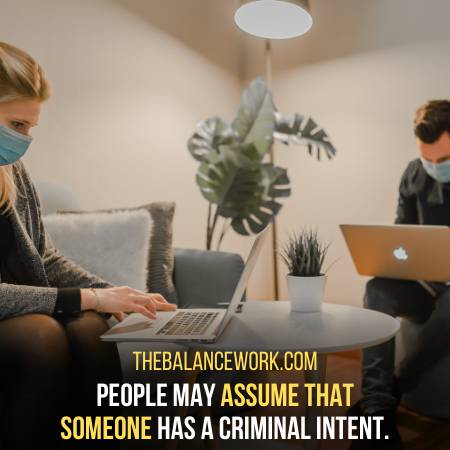
Aggressors do this because they have a fear of distrust.
4. Acknowledgment To One’s Intelligence
Not acknowledging someone’s intelligence or not crediting their work is also a microaggression.
The aggressor may invalidate the individual. It can drain the motivation and cause physiological or emotional damage.
5. Ignoring Or Talking Over The Females
When men ignore or talk over a woman in a meeting, it’s also microaggression. Being a female, you must have dealt with this.
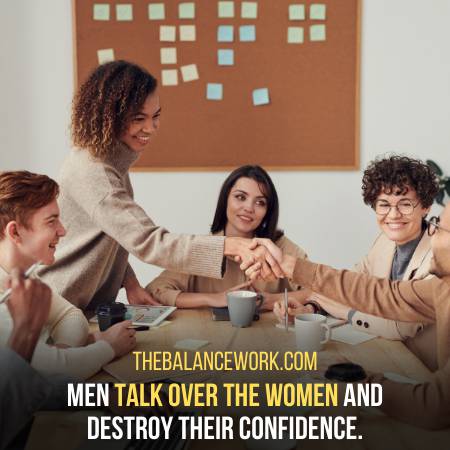
Men have this likelihood of talking over women in a meeting at the workplace or in a general conversation.
It directly attacks the confidence of a woman, and she is less likely to continue speaking up.
6. Environmental Microaggressions
Environmental aggressions happen when an industry doesn’t have much diversity. It includes gender, ethnicity, race, or sexual orientation.
A person can’t be agreeable enough in a company that offers no or less representation.
7. Sexism – Microaggressions In The Workplace
Sexism in an organization isn’t necessarily related to a specific gender. Anyone, either it’s a female or a male, can make sexist comments.
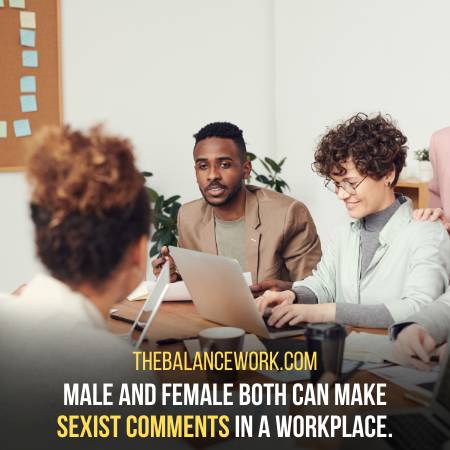
However, it’s totally unacceptable to make such comments. It leaves a strong negative impact on the workplace and the mental health of the person.
8. Assumption Of Older Employee’s Merit
It’s about assuming that older employees are not as good at technology as the young ones are.
It’s discrimination or ageism because age has no relation with technical skills.
9. Comments On Pregnancy
When someone passes comments related to pregnancy, it also counts as microaggression.
No matter how progressive the company is, such comments are unavoidable.
Pregnancy-related comments are a passive-aggressive indictment of pregnancy.
10. Mansplaining – Microaggressions In The Workplace
It happens when a male coworker forcibly tries to convey something to a female. Even if the female didn’t ask about it and she might have more knowledge than he does.
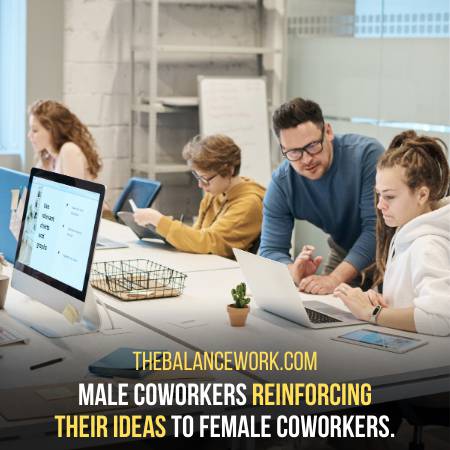
But he does it anyway for microaggression. It’s a downright insult because that female didn’t inquire about the information. She might be more knowledgeable than the person.
It also comes under the category of sexism.
11. Office House-Work Related Microaggressions
If you are ever asked to make coffee, take notes, or do other tasks, it’s microaggressions. Specifically when it’s not included in the early description of the job.
You might be getting asked to do so just because you are a female.
12. Over-Criticizing
When you get criticized so much, even if you perform well, it’s someone trying to belittle you.
In such a situation, it’s natural that you over-apologize to avoid further criticism.
13. Convincing The Females To Smile More
Reinforcing the idea that females need to be grateful and receptive is not good.

No one has the right at work to tell a woman how she should feel and how to demonstrate her feelings.
Workplace rights are equal, and a woman working there has a right to feel depressed if she is.
14. Hormone-Related Comments
When a coworker invalidates your feelings because they think it’s a hormonal outpour, it’s frustrating.
It causes much stress because no one has a right to write off your feelings in such an improper way.
15. Telling A Female Coworker How She Should Dress
It’s a lighter form of intimidation because a woman is getting told what she should do with her body.
There’s a clear line between telling a man to wear a tie and mentioning a female to change her dressing.
But some people don’t know that. However, if there’s a dress code in the office and someone isn’t following, you can politely remind her.
4 Ways To Shut Down This Microaggression
A good way to deal with microaggression in an organization is not responding with anger. Instead, try the following strategies to have better results.
1. Pause And Wait A Bit
First of all, you should remember that there’s no need to react at the moment.
Pause and take a deep breath to understand why it happened in the first place and be empathetic.
2. Analyze Your Assumptions
Tell the aggressor and make him understand how his insult has affected you. It won’t work every time because the person causing aggression will think he is right.

Instead of accepting his mistake, he will deny that there is some problem. But you should try to start a productive conversation and avoid engaging in a heated argument.
Remember that microaggressions will keep hurting other people in the organization.
3. Chop Off The Slack
When we hear an offensive thing, it’s natural to have judgments about that person. It’s important to validate this judgment.

The workplace is a respectable place and requires everyone to respect. However, if that person is a continuous offender, then it should get reported.
You should properly handle this and avoid letting your workplace become a point of aggression.
4. Give A Different Perspective
It isn’t your duty to educate the entire world; you should deal with it by adopting the ignoring approach.
However, you should approach this situation with an open frame of mind.
You might be successful in changing future interactions to positive communications.
Frequently Asked Questions
How Do You Prevent Microaggressions?
To prevent microaggressions, one should think twice before speaking. Ask yourself what do you mean before implying a stereotype on someone. Your friends from marginalized communities won't excuse you if you use microaggressions.
Can Microaggressions Be Non-Verbal?
Microaggressions can be verbal, non-verbal, and environmental slights or insults. It can be either intentional or unintentional. It's about communicating hostile or messages to target people based on their race.
How Do Microaggressions Affect Students?
Studies show that racial microaggressions deprive students of color of their learning capabilities. It causes psychological or physiological stress and worsens their academic experiences.
How Can We Prevent Microaggressions In The Classroom?
Develop standards of responsibility and behavior for working together with other people. Teach the students that impact is more important than intent. Ask them to rethink and rephrase their comments.
Conclusion
Microaggressions happen at work all the time, so one should know how to address them.
There are some ways to mitigate them in a positive and productive way. You can have a healthy dialogue and show empathy to the aggressor.
As we spend a lot of time together, the way we treat each other defines how we feel at work. So these interactions should be healthy and helpful for all.
If you ever faced microaggression, share your experience in the comment section below.
Last Updated on 1 year by Shahzaib Arshad
- 7 Jobs For People With Cerebral Palsy – Tips To Manage Yourself - October 6, 2022
- 15 Easy-On-Hand Jobs For People With Chronic Fatigue In 2022 - October 2, 2022
- Top 9 Low-Stress Jobs For People With Agoraphobia - October 1, 2022